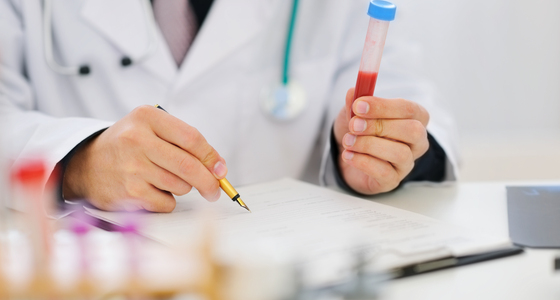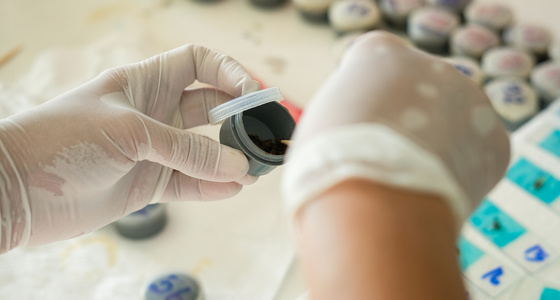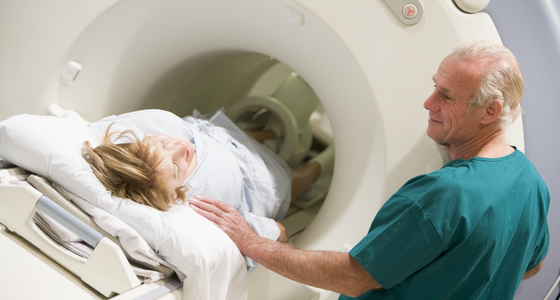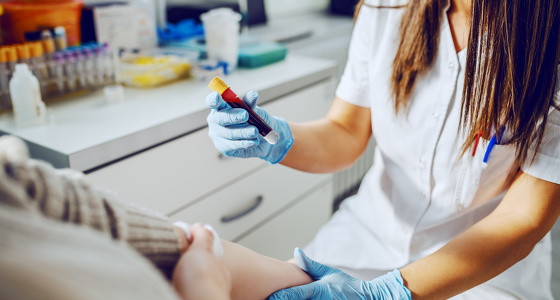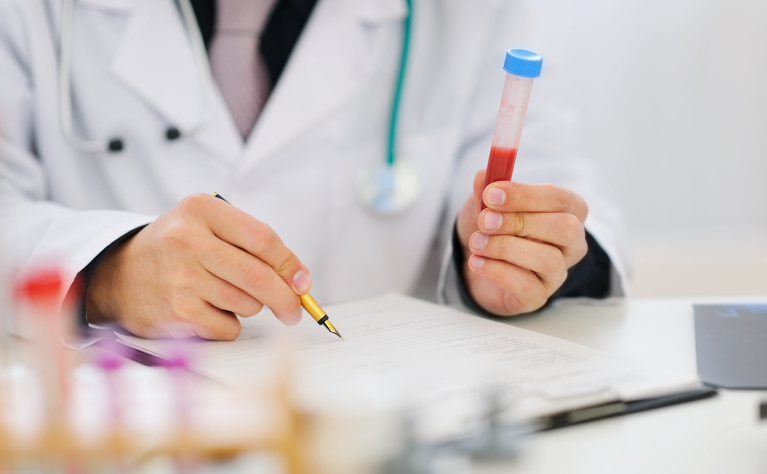
Blood tests are used to both help with a diagnosis of inflammatory bowel disease (IBD) and also to monitor your condition once you have a diagnosis.
Blood tests are one of the most common medical tests for diagnosing any condition.
Unfortunately there are no blood tests that can directly diagnose IBD. A blood test can be done to test for inflammation in the body. This test does not show where in the body the inflammation is occurring but it does indicate that further tests as to the source of the inflammation need to be done.
Other blood tests, such as a full blood count, can help to show inflammation and if you have anaemia (low iron levels).
Full blood count (FBC)
A full blood count measures the amount and different types of blood cells (red cells, white cells and platelets) present. It is a very common blood test. Although it can’t provide a definite diagnosis of IBD it can provide clues that you may be suffering from IBD. It can also be used to measure levels while on certain drugs for IBD.
If your FBC shows a higher white blood cell count and/or an increase in the number of platelets (which help to stop bleeding by forming blood clots) this can indicate that you have inflammation - and inflammation can be a sign of IBD.
A FBC test can also detect anaemia by measuring red blood cells. People with IBD can be at risk of anaemia.
Drugs given for IBD - such as azathioprine and mercaptopurine, can affect bone marrow and reduce the number of red and white blood cells and platelets. If you are on these drugs you may be given FBC tests on a regular basis to monitor your levels.
Serology
In recent years various antibodies have been identified as being associated with IBD. Serology tests for markers which indicate these antibodies. It can help to determine if you have IBD and, if so, which type of IBD you may have and its severity. Markers tested for include pANCA, ASCA, CBir1, and OmpC.
But, these markers are not always present in all people with IBD and can be present in people who do not have IBD so it is not 100% accurate.
These tests are fairly new and have varying degrees of acceptance among healthcare professionals.
Ferritin and transferrin tests
Ferritin is a protein which can be measured to indicate inflammation. It also stores iron and a low level of ferritin can be a good way of showing if you have low levels of iron in your blood. Anaemia is often caused by a lack of iron and people with IBD often suffer from anaemia. Transferrin is another protein which binds to iron. A test can be done to show how much iron is actually being carried by transferrin and if it is low this, again, can indicate an iron deficiency.
Urea and electrolytes (U&E)
People who are suffering with acute diarrhoea can often become dehydrated. The right balance of electrolytes (dissolved body salts like sodium, potassium and chloride) are important in helping your body’s blood chemistry, muscle action and other processes. If you are dehydrated then it can cause an imbalance in your electrolytes. A U&E test will measure the levels of electrolytes and give an indication of dehydration. It will also measure the levels of urea, which is produced in the liver when excess amino acids are broken down. It may also be requested to measure the levels of creatinine in your blood. Creatinine is a waste product in your blood that comes from normal muscle wear and tear. The kidneys are responsible for the removal of creatinine from the blood, so if your kidney function declines, creatinine levels in the blood rise. A U&E test measures how well your kidneys are functioning. Some IBD medications can affect the kidneys so regular U&E tests are recommended if you are on these medications. These include cyclosporine, sulfasalazine and the 5-ASA drugs.
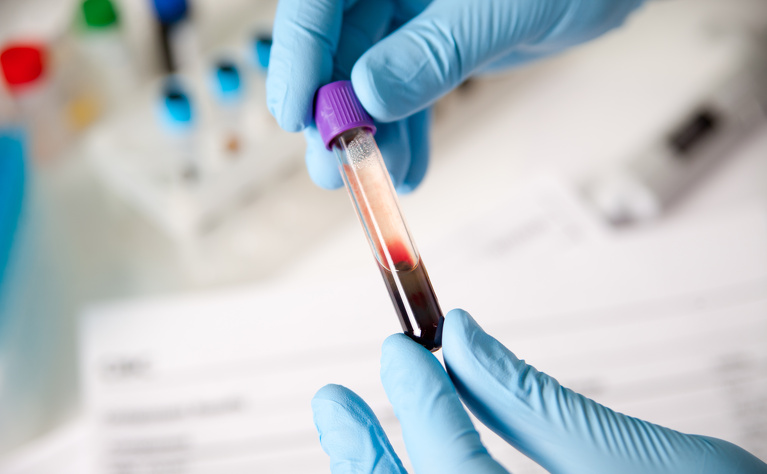
Liver function tests (LFT) also known as liver enzyme test
The results of a liver function test can help to indicate inflammation. They can also indicate some rare liver complications as a result of IBD. A LFT measures levels of a specific group of proteins (known as serum albumin) and enzymes. If the levels of this protein are low then this can be an indication of inflammation. The liver can also be affected by medications used to treat IBD so screening is also done for liver complications. Primary sclerosing cholangitis (PSC) can develop in people with IBD (more common with ulcerative colitis (UC)).
Inflammatory marker tests
Proteins found in blood (also known as biomarkers) can help to indicate inflammation - and inflammation can be a sign of IBD. These tests cannot be used to diagnose IBD but can help to give an indication. The two main inflammatory marker tests used for IBD are c-reactive protein (CRP) and erythrocyte sedimentation rate (ESR).
CRP: This test measures the level of one specific protein. It is sometimes called an acute phase protein - meaning the level increases when you have certain diseases that cause inflammation - such as IBD.
ESR: This test measures many different types of proteins. After the blood sample has been collected it is placed in a chemical to stop the blood from clotting. When this is done the red blood cells gradually fall to the bottom of the tube, leaving the plasma at the top. In this test the rate which the red blood cells separate from the plasma is measured - this is known as the ESR. It is measured in millimetres per hour. A high ESR indicates inflammation. Levels of ESR are naturally higher in women and increase as you age.
Thiopurine s-methyltransferase test (TPMT)
A thiopurine s-methyltransferase test is carried out to see if someone is at risk of experiencing side effects from thiopurine drugs. These include azathioprine and mercaptopurine which are used to treat IBD. If you have no detectable TPMT activity you are at risk of developing side effects from these drugs. Unfortunately, this test is not effective at identifying everyone who may get side effects.
Tests for vitamins and minerals
Screening tests
These blood tests check for infectious disease such as Hepatitis B or C, tuberculosis, HIV or chicken pox. It is important to know if you have or have had any of these diseases before you are placed on certain medication - such as immunosuppressants or antiTNF drugs (which include infliximab and adalimumab).
Prognostic tests
A prognostic test predicts something, such as your likelihood of developing a disease or likely events happening during the course of that disease. They are different from diagnostic tests, which diagnose specific diseases and conditions.
In respect to IBD, prognostic tests predict the likely progress of your disease (your prognosis), such as your likelihood to experience repeated flares or the likelihood you will develop complications. This information could then help to inform the treatment you are given.
During a blood test a sample of blood is taken from your body and then sent away to a laboratory for testing. What they test for determines on what your symptoms are and what the healthcare professional suspects you may be suffering from.
The most common way of getting the blood sample is from a vein in your arm, often on the inside of your elbow, or sometimes the inside of your wrist. For children, and some other patients, blood may be taken from the back of the hand or via a pinprick on a finger.
A tourniquet (a tight band) is often placed around the top of the arm to squeeze it and slow the flow of blood. This aids in getting a sample. The doctor or nurse will probably clean the area where the sample will be taken with an antiseptic (often a wipe) and then a needle attached to a syringe or other container is pushed into the arm. The syringe is then used to draw out a sample of blood.
This shouldn’t be painful, but it may be uncomfortable for a short time. Once the necessary blood has been taken the needle will be removed and pressure will be placed on the wound to stem the blood flow. A plaster will then be placed over the site to keep it clean.

Blood tests are very safe, and any side effects you may experience should be very minor. Here are some of the common ones:

